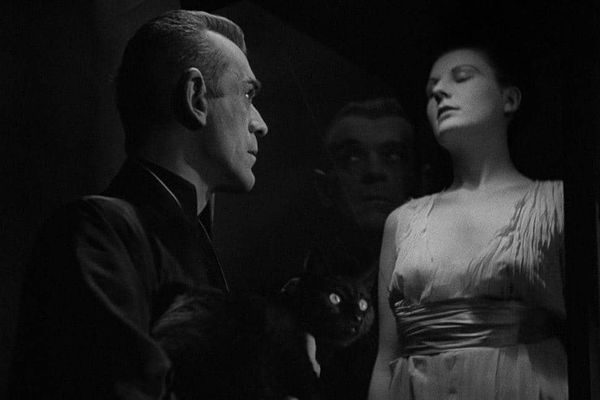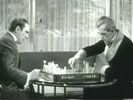Eye For Film >> Movies >> The Black Cat (1934) Film Review

1930s horror movies – creaky sets, ham acting and a Hays Code approach to anything resembling sex and violence, right? Emphatically wrong, as this re-issue of one of the best from the Universal vault amply demonstrates.
Like Nosferatu and Night Of The Demon, this is one of those films that you prepare to watch with an indulgent smirk and the odd giggle at how easily people were frightened all those years ago – then realise 20 minutes in that you’re not laughing any more, and that the generation that lived through World War One were well acquainted with all the horrors the human mind can conjure up.

Another thing it has in common with the two films mentioned above is that it takes its inspiration from a classic 19th century tale of the macabre, then pretty much does what it likes with the source material. Here, all that remains from Edgar Allan Poe’s prime slice of American Gothic is the protagonist’s pathological fear of the wool-chasing furball-spitters.
Said protagonist is Dr Werdegast (Bela Lugosi), an eminent Hungarian psychiatrist travelling through MittelEuropa on the Orient Express. He joins the compartment of American newlyweds Peter Allison (David Manners), a mystery writer, and his Austrian-born wife Joan (Jaqueline Wells), and immediately gives them the creeps like nobody’s business.
It’s clear that co-writers Edgar G Ulmer and Peter Ruric regarded the new Hays Code as something to be honoured more in the breach than the observance. The spiffy Yanks’ innuendo-laced banter is immediately replaced by Lugosi’s barely-concealed fascination with Joan’s beauty. A scene where he touches her hair as the couple sleep is simultaneously touching and deeply sinister.
Arriving at a storm-lashed station in the middle of nowhere all three are met by a car from their hotel, but (wouldn’t ya know?) it crashes into a ditch, killing the driver and forcing the passengers to take refuge in a nearby mansion.
This, of course, turns out to be a Very Bad Idea. The lord of the manor is Poelzig (Boris Karloff), a brilliant architect and World War One commander, who has built his new pad on the site of the battlefield where he betrayed thousands of men to the Russians. Werdegast was one of them (with the added niggle that Poelzig ran off with his wife while he was a PoW); his presence in the area is no accident and, after 15 tormented years, he’s thirsting for vengeance. But Poelzig has a few tricks up his sleeve – and a large black cat...
From then on, things get really strange. Poelzig has become a Satanist, embalming a series of sacrificed maidens and preserving them in glass cases (another nod to the Poe original). Werdegast’s wife is one of them, but Poelzig has now taken her daughter Karen (Lucille Lund) as his bride. This leaves him one short for the next meeting of the local coven, but there’s a beautiful and conveniently injured American girl in the spare room...
Such a summary gives only a hint of the film’s wonderfully surreal, nightmarish universe. Despite the fact that no supernatural events actually occur, there’s an all-pervading air of evil, insanity and downright perversion, with Ruric and Ulmer throwing everything but the kitchen sink at the audience in just over an hour – a game of chess for a life (20 years before Bergman thought of it), a starkly lit satanic altar, a flaying alive and a literally explosive climax. But despite all the set pieces and the short running time, there’s also a sense of claustrophobia and time suspended, with the audience as trapped as the characters.
And the trap itself is another triumph. Instead of the usual cobwebbed castle, Karloff’s lair is all Modernist lines and stark black-and-whites, a thoroughly 30s dwelling – but built on a decaying, dynamite-wired fortress that was once a tomb for an entire army. It’s a subversive comment on the rebuilding of Europe, as well as a brilliantly original hellhole.
Karloff makes a fitting host, enunciating each gloriously villainous line with actorly precision, and achieving the same gaunt, unearthly look he managed in Frankenstein without the aid of makeup. Lugosi is a fitting match for him, an equally haunted and obsessive figure. There are no heroes here; the American couple are merely a plot device to get two doomed emblems of a troubled century head to head.
It does have its flaws – the strident score is constantly intrusive, and there’s the usual ‘comic’ parade of rustics and buffoonish policemen to dissipate the tension. But for the most part Ulmer (a contemporary of the great German Expressionists whose ability to flit between genres when he arrived in Hollywood perhaps prevented him attaining the reputation of horror icons like James Whale and Todd Browning) creates and sustains a nerve-wracking, unsettling atmosphere with a very modern message; the worst horrors are of human origin.
If you’ve only seen Lugosi and Karloff in their unhappier B-movie later years, this is a welcome reminder of two great horror actors at the peak of their game. But be warned – as the old poster taglines used to say; you will come to scoff, but stay to shudder.
Reviewed on: 06 Nov 2007

















